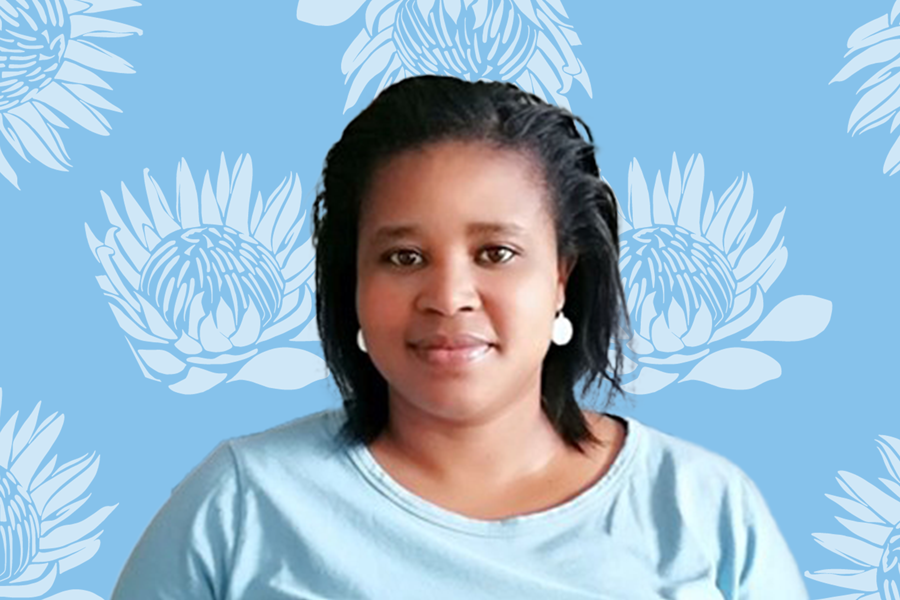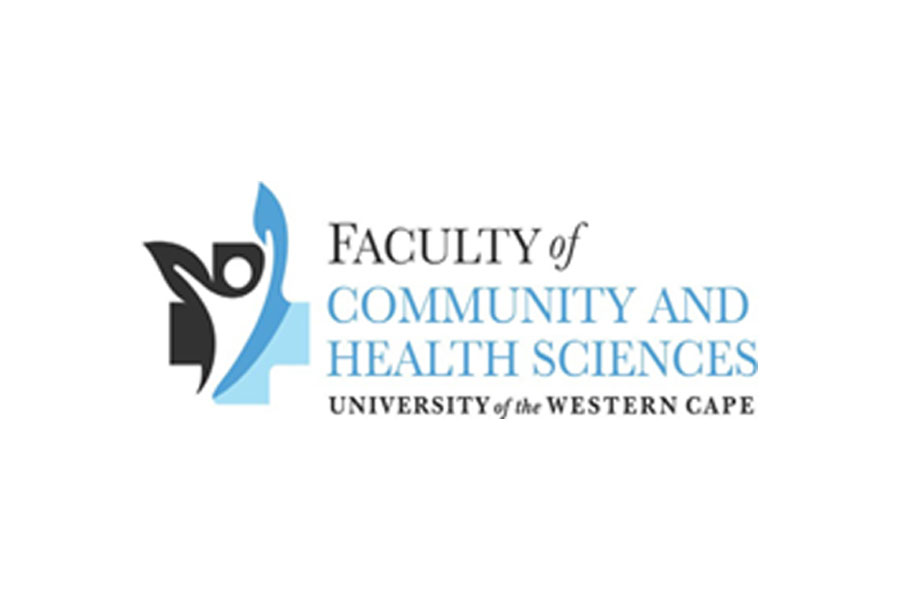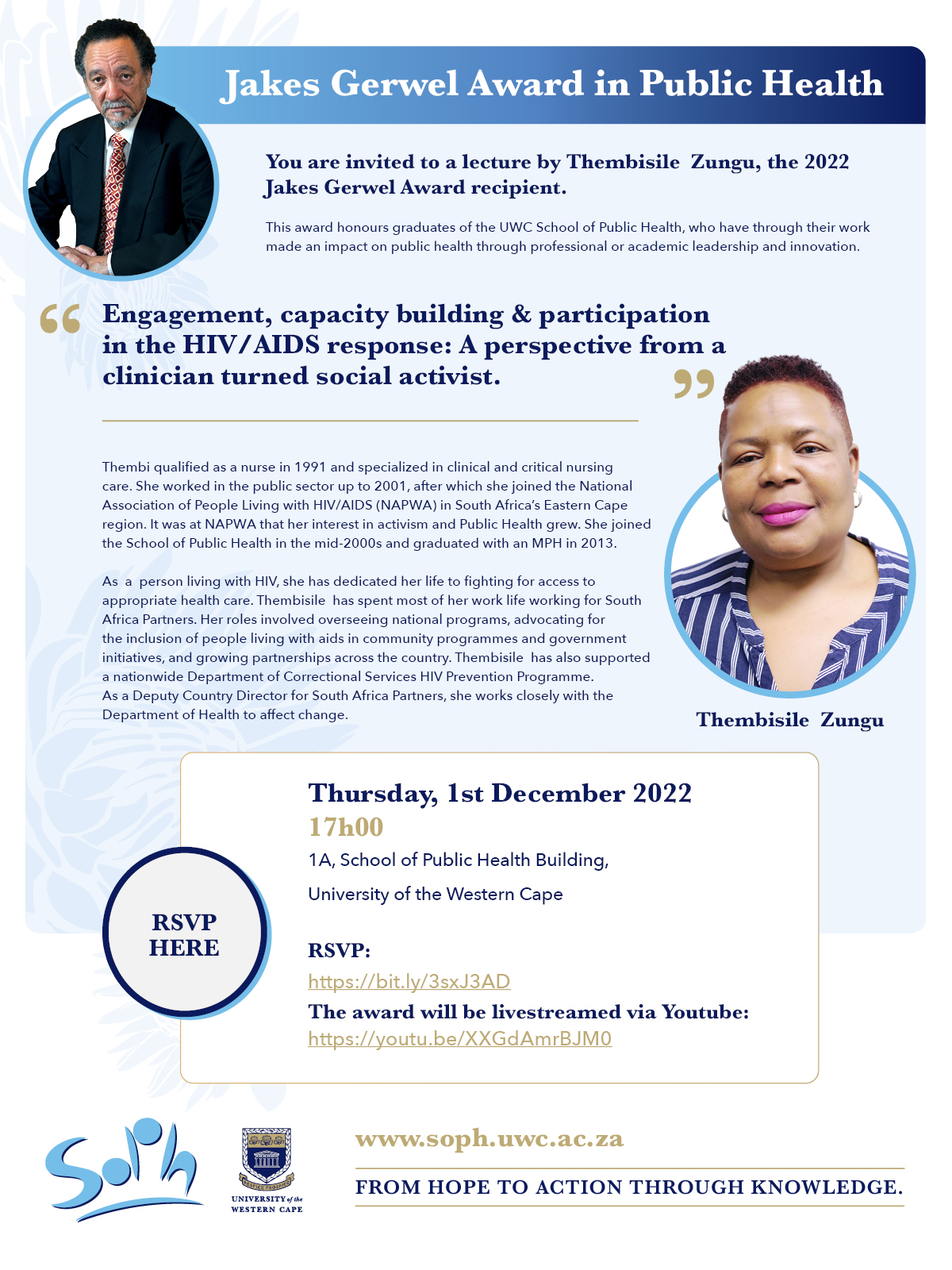
Qualitative Evidence Synthesis protocol development
29 August 2022
DSI/NRF SARChI Chair in Health Systems Governance Postdoctoral Fellowship 2023
15 February 2023Jakes Gerwel Award 2022: Thembisile Zungu
This award honours graduates of the UWC School of Public Health, who have through their work made an impact on public health through professional or academic leadership and innovation.
Thembisile Zungu
“Engagement, capacity building & participation in the HIV/AIDS response: A perspective from a clinician turned social activist” needs to be somewhere prominent on the post”
Thembi qualified as a nurse in 1991 and specialized in clinical and critical nursing care. She worked in the public sector up to 2001, after which she joined the National Association of People Living with HIV/AIDS (NAPWA) in South Africa’s Eastern Cape region. It was at NAPWA that her interest in activism and Public Health grew. She joined the School of Public Health in the mid-2000s and graduated with an MPH in 2013.
As a person living with HIV, she has dedicated her life to fighting for access to appropriate health care. Thembisile has spent most of her work life working for South Africa Partners. Her roles involved overseeing national programs, advocating for the inclusion of people living with aids in community programmes and government initiatives, and growing partnerships across the country. Thembisile has also supported a nationwide Department of Correctional Services HIV Prevention Programme. As a Deputy Country Director for South Africa Partners, she works closely with the Department of Health to affect change.
Thembi Zungu Citation
Thembi was born in Mpangisa, a village in KwaZulu Natal, where she did most of her schooling. She later moved to eThekwini to complete high school. Thembi Zungu’s career in Public Health spans over three decades and began in 1991 after graduating as a Registered Nurse. Her career as a nurse started during a challenging time in our history when new conditions were emerging, and the political environment was changing. She first attained her clinical nursing experience as a professional nurse in charge of a Dermatology Clinic at the King Edward Hospital. She later worked in intensive care units at King Edward VIII in KwaZulu Natal and Livingstone Hospital in the Eastern Cape. Her last clinical nursing experience was in Primary Health Care Clinics in Ggeberha at a time when morbidity and mortality due to HIV/AIDS were increasing in the absence of life-saving treatment.
Her personal experiences challenged her to join the NGO Sector, working for the National Association of People Living with HIV/AIDS (NAPWA), focusing on human rights, advocacy, information dissemination, capacity building and technical support promoting the inclusion of People Living with HIV in community programmes and government initiatives. Thembi’s work at the National Association of People Living with HIV/AIDS (NAPWA) was the beginning of a life committed to improving the lives of those Living with HIV and fighting for the rights of voiceless community members. Moreover, while at NAPWA, she led the development of NAPWA Branches in the Eastern Cape.
Thembi joined South Africa Partners in 2004 and led prevention, treatment and care programmes supporting South African Health Systems (National Department of Health & Correctional Services) and community capacity building.
The projects that she has spearheaded include:
- Providing program support which was a partnership with the National Department of Correctional Services focusing on Tuberculosis, Human Immunodeficiency Virus, Hepatitis B Prevention and sensitization of Department of Correctional Services Officials and inmates on prevention of infections, Sex and Sexuality, Substance Abuse, Violence Prevention and Integrated Access to Care and Treatment (IACT) using a peer education model in correctional facilities.
- LinkCARE Program: a partnership with the South African National Department of Health focusing on the roll-out of Adherence Guidelines and Integrated Access to Care and Treatment (IACT) to implement Key Aspects of HIV/AIDS Care, including other chronic illnesses.
- One of her current projects is the Strengthening Combination Prevention Services in Correctional Facilities (STEPS 3), where she serves as a Co-Principal Investigator providing support to the Implementation Team in collaboration with the Centers for Disease Control and Prevention (SA) and the National Department of Correctional services supporting Gauteng, Eastern Cape, Free State and Northern Cape provinces in 33 High Burden Correctional Centers. The program aims to support HIV Testing Services for inmates and parolees to provide Antiretroviral and Pre Exposure Prophylaxis, with a strong emphasis on viral load management.
Thembi’s experience at South Africa Partners propelled her to further her studies at the School of Public Health at UWC. She first registered for a diploma in Public Health, which increased her appetite for learning. She later enrolled for a Masters in Public Health and the title of her Dissertation “Knowledge & Practices of Infant feeding among HIV positive mothers attending the prevention of mother to child transmission Programme, in the Eastern Cape”, and graduated in 2013. The topic she chose was based on her experience and the infant feeding struggles of HIV-positive mothers. All this shows her desire to improve the lives of the vulnerable.
As an advocate, her many achievements include:
- Disclosing her HIV status as a professional nurse during a time when being positive was shunned upon.
- Being part of the team that visited Massachusetts in 2003 to take a model of early intervention for HIV/AIDS care piloted by the Massachusetts Department of Health and “translated” it to the South African context.
- Development of the STEPS Program, which is implemented in the Department of Correctional Services
- Developing a sensitization curriculum for Correctional Services focusing on human sexuality, violence and abuse, human rights and drug abuse
- Being part of the first team to develop the curriculum for healthy living support groups for People living with HIV and their Families, which later was piloted and birthed what we now call Integrated Access to Care and Treatment (IACT) implemented in 2010 and ongoing.

